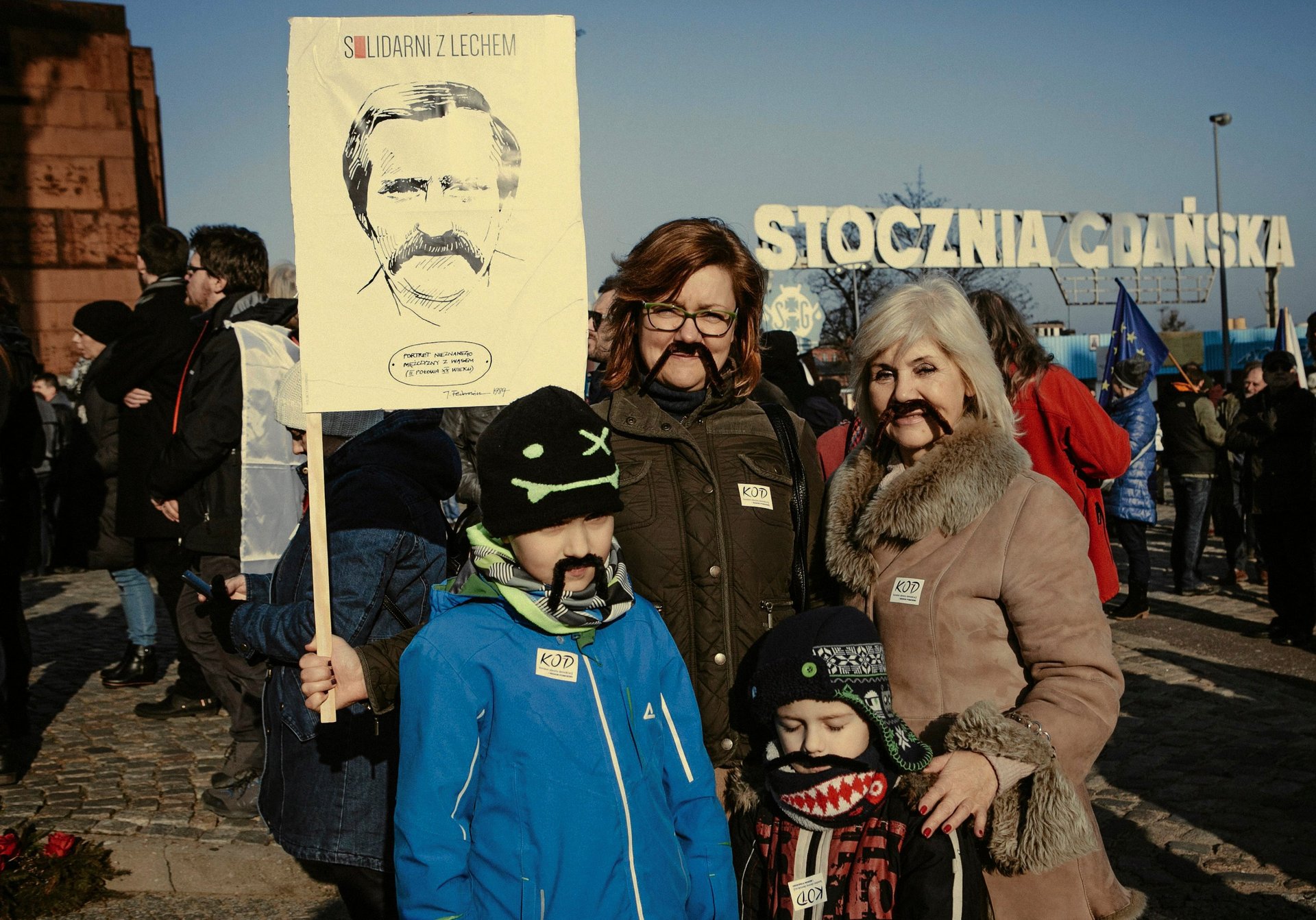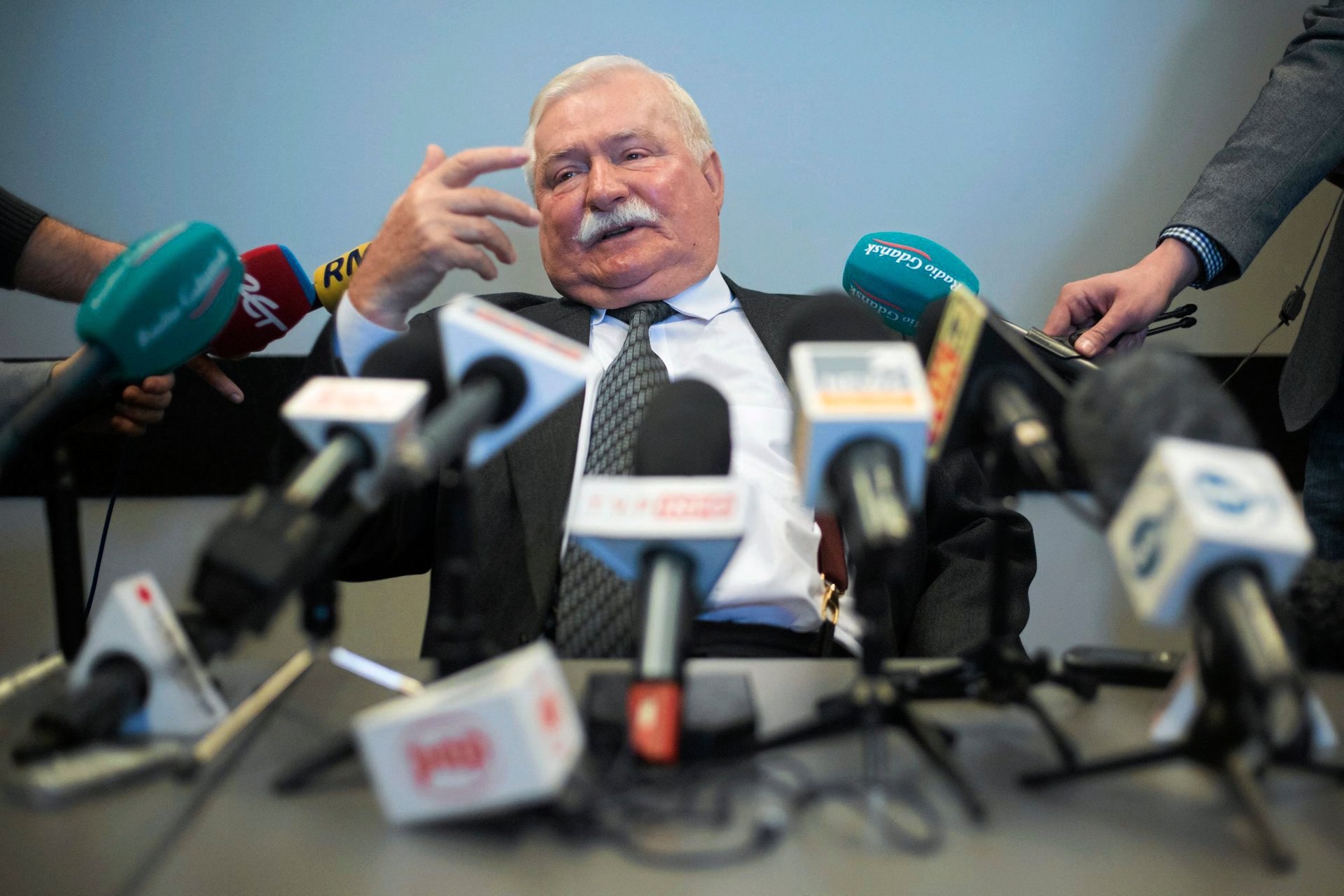Why are Polish people suddenly quoting the US constitution at big political protests?
Lech Walesa, the 72-year-old former Polish president and leader of the “Solidarity” movement that brought down Communist rule in Poland in 1989, has found himself at the center of mass political protests once again.


Lech Walesa, the 72-year-old former Polish president and leader of the “Solidarity” movement that brought down Communist rule in Poland in 1989, has found himself at the center of mass political protests once again.
Poles turned out in droves, with up to 80,000 in Warsaw, according to city hall, 15,000 in Gdansk, his hometown, and at smaller demonstrations all over the world. This time, they were not rallying with Walesa, but for him. They gathered to show support for the Nobel prize winner, who had been accused of collaborating with the Communist regime 40 years ago.
His supporters don’t care whether the allegations, revealed in new documents unearthed by the country’s rightwing government, are true, citing Walesa’s eventual, pivotal contribution to Poland’s peaceful transition to democracy. For them, if anything, the controversy has unleashed a wave of nostalgia, with many taking a fond walk down memory lane, sharing stories about Walesa on social media. Photos of the burly, mustachioed electrician dominate news feeds.

One such post (link in Polish), by Andrzej Celinski, a fellow “Solidarity” leader, detailed the fascinating backstory of Walesa’s iconic speech before a joint session of the US Congress in 1989. As communism was collapsing across eastern Europe, Walesa’s speech—delivered by one of the very few non-heads of state to ever address a joint session—served as “a kind of Cold War catharsis,” columnists wrote at the time.
Celinski, currently the head of Poland’s small Democratic Party, recounted how Walesa’s inner circle came up with the idea to lead the speech with the first words of the preamble to the US Constitution, “We the People.” In a historical echo, the phrase was re-deployed as a slogan by crowds at pro-Walesa demonstrations last week.
A first-grade civics lesson
Celinski said that Walesa owed the speech’s famous opening line to the six-year-old daughter of a Polish journalist living in Washington, DC. (I knew said daughter and her family as a child.)
Celinski and the journalist, Jacek Kalabinski, were in the latter’s living room in 1988, discussing Walesa’s forthcoming visit to the US. How could they interest the American public in their cause? A speech to Congress was already a very rare honor, but Celinski writes that they worried about how to make a “housewife from Wisconsin” care. They spoke of a “six second rule” on American TV, stressing the need to capture the attention of the channel-surfing public from the very beginning.
“This is going to be a disaster,” Celinski says he thought at the time. “What can you say in six seconds so that tens of millions of Americans don’t change the channel, or that the local news doesn’t interrupt the broadcast?”
Kalabinski’s wife Barbara, who was cooking in the kitchen, interjected. “She yelled: ‘WE THE PEOPLE’,” Celinski writes. She then explained to a confused Celinski, who was visiting from Poland, that the couple’s first-grade daughter was learning the preamble to the US Constitution at school. “And that’s what happened,” Celinski writes.
A year later, Walesa’s speech, simultaneously translated by Kalabinski, began with a loud, dignified “My, Naród.” A pause, then the translated “We the People,” and spontaneous applause from all in the chamber.
“Walesa’s message was simple,” Celinski writes:
Here we Poles are joining the great democratic family… our politics will be guided by the values of the democratic world, with reason and sense, and not myth and greed. Today, 26 years later, we are guided by the same message.
Bad blood
The accusations that Walesa collaborated with the hated Communist regime arise from time to time, even after a special court cleared him of any wrongdoing in 2000. This time around, the documents at the center of new allegations came from the home of a notorious late Communist interior minister, seized by a state-run historical institute politically aligned with the governing Law and Justice party.
The documents contain an agreement to cooperate with the regime’s secret police in the 1970s, allegedly signed by Walesa before he and others founded the “Solidarity” trade union that would prove instrumental in the demise of communism in Poland. They also include receipts for payments made in exchange for information.
His “legend probably cannot be defended any more,” foreign minister Witold Waszczykowski told a public television station.

Walesa denies the signature is his and has threatened to sue the institute. But he has also admitted in the past to a “mistake” of signing some documents at the time. The release of the papers without scientific verification has been criticized by centrist and liberal media, as well as former anti-Communist opposition leaders, who say it is politically motivated.
Walesa is an outspoken critic of the Law and Justice party—he and the party’s leader, Jaroslaw Kaczynski, have been enemies for decades. The socially conservative and populist Law and Justice swept both the presidential and parliamentary elections last year, becoming the first party to win a majority of seats since the fall of communism. The new government swiftly embarked on a mission to re-shape the country’s political system, introducing controversial reforms that allow the government to exert greater control over the country’s constitutional tribunal and the media.
Although Poland has been touted as rare economic success story in Europe, many Poles feel they have not benefitted from the growth. This discontent contributed to the rise of Law and Justice, which has promised a boost in public spending, a cut in the retirement age, and other measures. ”Walesa is an opportunity for [Law and Justice] to cover up economic issues,” Tadeusz Bartos, a liberal commentator, told Reuters.
On current evidence, the tactic might not be working as intended. “If it turned out that Walesa signed a declaration of cooperation, or even informed, and later backed out,” said Wladyslaw Frasyniuk, a prominent former member of the anti-Communist opposition (link in Polish), ”then this is proof that he had in himself the strength to come from the dark side of the force, to the light side.”